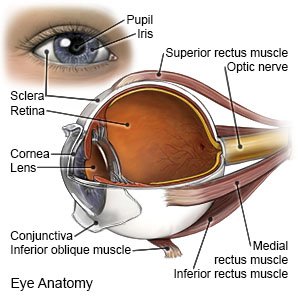Surgery for Retinal Detachment
Medically reviewed by Drugs.com. Last updated on Aug 4, 2025.
What do I need to know about surgery for retinal detachment?
Surgery for retinal detachment is done to reattach your retina to the back of your eye.
 |
How do I prepare for surgery?
You may not have time to prepare for surgery. If you have time to prepare, your healthcare provider will tell you how.
- You may be told not to eat or drink anything after midnight on the day of your surgery. Ask someone to drive you home and stay with you for 48 hours after surgery.
- Tell your provider about all your current medicines. He or she will tell you if you need to stop any medicine for the procedure, and when to stop. He or she will tell you which medicines to take or not take on the day of your surgery.
- Tell your provider about any allergies you have, including to anesthesia or medicines. You may be given an antibiotic to help prevent a bacterial infection.
Related medications
What will happen during surgery?
- You may be given general anesthesia to keep you asleep and free from pain during surgery. You may instead be given IV sedation to make you feel calm and relaxed during surgery. If your are given IV sedation, you will also be given local anesthesia to numb the surgery area. With local anesthesia, you may still feel pressure or pushing during surgery, but you should not feel any pain.
- Your retina may be reattached to your eye with 1 or more of the following:
- A vitrectomy is surgery to remove vitreous gel from your eye and replace it with a gas or oil bubble. The bubble will allow the retina to return to the correct place. If an oil bubble is placed, you may need another surgery to remove it.
- A scleral buckle is surgery to place a flexible band around your eye. Your surgeon may also drain fluid from beneath your retina. This will help move the retina back into its correct position. You will not feel or see the band around your eye.
- A pneumatic retinopexy is surgery to inject a gas bubble into your eye. The bubble helps push the retina into the correct place. The bubble will reabsorb over time. A laser or freezing treatment will be used to permanently hold the retina at the back of the eye.
What should I expect after surgery?
- Healthcare providers will monitor you until you are awake. Do not get out of bed until your healthcare provider says it is okay.
- You may need to keep your head in 1 position. This can help prevent an increase in pressure in your eye.
- You may have pain and swelling in or around your eye for several days. You may also have bloody or pink eye drainage for 48 hours.
- It may take several months for your vision to get better.
What are the risks of surgery?
You may bleed more than expected or get an infection. Eye structures may be damaged during surgery. You may develop a cataract or glaucoma. Surgery may not improve or return your vision.
Care Agreement
You have the right to help plan your care. Learn about your health condition and how it may be treated. Discuss treatment options with your healthcare providers to decide what care you want to receive. You always have the right to refuse treatment. The above information is an educational aid only. It is not intended as medical advice for individual conditions or treatments. Talk to your doctor, nurse or pharmacist before following any medical regimen to see if it is safe and effective for you.© Copyright Merative 2025 Information is for End User's use only and may not be sold, redistributed or otherwise used for commercial purposes.
Further information
Always consult your healthcare provider to ensure the information displayed on this page applies to your personal circumstances.
